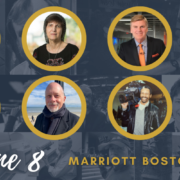Six broadcasters set for 2023 induction
Three from Television, Two from Radio, and a Professor of Communications Will be Inducted into the Massachusetts Broadcasters Hall of Fame Thursday, June 8
WCVB-TV’s long-time sports anchor Mike Lynch, the late and beloved Channel 7 videographer Therman Toon, the late WBZ-TV reporter, the gifted storyteller Bill Shields, as well as WBZ Radio’s heralded news reporter and “poet laureate” Carl Stevens, and Spanish music radio station entrepreneur Pat Costa will be inducted into the Massachusetts Broadcasters Hall of Fame on Thursday, June 8, along with Lesley University Communications Professor and former rock and roll DJ Donna L. Halper.
Professor Halper, a former DJ, music director, and radio consultant, will also receive the Hall of Fame Pioneer Award, given, as Hall of Fame Committee Chair Peter Brown explained, “to individuals who have distinguished themselves over decades for lasting contributions made to the broadcast industry and through a leadership role in their particular craft.”
 Tickets for the June 8 Hall of Fame luncheon are $90 each, or if purchased by May 18, $80 each. Full tables of eight, nine, and ten are available. The luncheon event will be held at the Marriott Boston Quincy Hotel located at 1000 Marriott Dr. in Quincy.
Tickets for the June 8 Hall of Fame luncheon are $90 each, or if purchased by May 18, $80 each. Full tables of eight, nine, and ten are available. The luncheon event will be held at the Marriott Boston Quincy Hotel located at 1000 Marriott Dr. in Quincy.
This year’s MA Broadcasters Hall of Fame Awards Ceremony and Luncheon will be the 15th such program, and the six 2023 inductees will join a distinguished group of more than 150 past honorees in the Hall of Fame.
Alphabetically by last name, the 2023 inductees are:
Pat Costa is best-known for bringing the popularity of Spanish music radio stations to the

Merrimack Valley and Greater Boston area. Prior to 1990, Spanish music was relegated to a few hours of weekend block programming on various stations in the Lawrence, Lowell, Haverhill area. Today, among five radio stations that he owns, Pat Costa’s Costa-Eagle Radio Ventures station, Power 800 AM/102.9 FM WNNW airs a Spanish-language “tropical music” format and is the number-one Spanish language radio broadcaster in the Boston area. Costa-Eagle is a media partner of the Lawrence Eagle-Tribune. Another Costa-Eagle entity, WUBG 1570 AM, is a Spanish-language station licensed to serve Methuen. The station format is called “LatinX.” In addition to music, Pat Costa stations provide news and public affairs programming to nearly 100,000 Hispanic speaking residents. His stations were instrumental in the success of the Hispanic Week Festivities in the City of Lawrence.
 Mike Lynch is a correspondent for WCVB-TV’s award-winning sports department with special focus on his signature “High Five” high school sports series and the Thanksgiving night high school football special, as well as other major sporting events. He was, for 34 years, the principal weeknight sports anchor for Channel 5 and, in all, a member of the WCVB sports team for 37 years. From 1995 through 2008, Mike hosted the weekly sports program “Patriots All Access,” a behind-the-scenes look at New England’s NFL franchise, and served as a broadcast commentator during Patriots pre-season games. He has also done play-by-play coverage for the Boston Celtics, New England Patriots, and college football. For 11 years, he hosted the Boston College weekly football coach’s show “Eagles Preview.” In 1985, Mike initiated “High Five,” a weekly report highlighting the achievements of high school student athletes. For more than 30 years, these unique segments have been lauded by critics and received numerous honors for a continuing commitment to covering high school athletics. Mike was voted Massachusetts “Sportscaster of the Year” by the National Sportswriters and Sportscasters Association in 1985-1991, 1999, 2003, and 2006-2012 for a total of 16 times, the most honors of anyone in the history of the award. In 1987, SportsCenter 5 won the United Press International Award for “Best Sports Reporting” in the country.
Mike Lynch is a correspondent for WCVB-TV’s award-winning sports department with special focus on his signature “High Five” high school sports series and the Thanksgiving night high school football special, as well as other major sporting events. He was, for 34 years, the principal weeknight sports anchor for Channel 5 and, in all, a member of the WCVB sports team for 37 years. From 1995 through 2008, Mike hosted the weekly sports program “Patriots All Access,” a behind-the-scenes look at New England’s NFL franchise, and served as a broadcast commentator during Patriots pre-season games. He has also done play-by-play coverage for the Boston Celtics, New England Patriots, and college football. For 11 years, he hosted the Boston College weekly football coach’s show “Eagles Preview.” In 1985, Mike initiated “High Five,” a weekly report highlighting the achievements of high school student athletes. For more than 30 years, these unique segments have been lauded by critics and received numerous honors for a continuing commitment to covering high school athletics. Mike was voted Massachusetts “Sportscaster of the Year” by the National Sportswriters and Sportscasters Association in 1985-1991, 1999, 2003, and 2006-2012 for a total of 16 times, the most honors of anyone in the history of the award. In 1987, SportsCenter 5 won the United Press International Award for “Best Sports Reporting” in the country.
Donna Halper, winner of this year’s Massachusetts Broadcasters Hall of Fame Pioneer Award, was an original Board member of the MA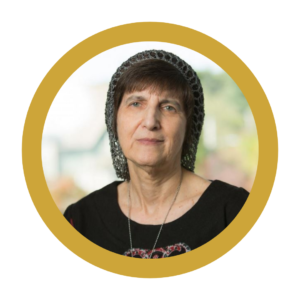 Broadcasters Hall of Fame. She is a prolific and respected broadcast historian, professor at Lesley University, and much more. A former disc jockey, music director, and radio consultant, she spent more than three decades in broadcasting before becoming a college professor. She came to Lesley in 2008 to develop and teach courses related to the study of communication and media, including Media Analysis, Introduction to Communication, and Introduction to Journalism. Donna’s teaching is informed by her knowledge of popular culture and media history. She is the author of six books and has been widely quoted by reporters seeking information about local and national media trends. In addition to teaching, Donna is the editor of the Lesley Public Post (Lesley’s student newspaper). She is a blogger and a free-lance writer. She has given many guest lectures at libraries, civic organizations, and other universities. And she is known for discovering the classic rock band Rush, who dedicated two albums to her; she can be seen in the 2010 documentary “Beyond the Lighted Stage.” Donna holds multiple degrees from Northeastern University – while an NU student, she was the first female DJ at the school’s radio station – and a PhD in Communication from the University of Massachusetts at Amherst. Among the books she has written are Invisible Stars: A Social History of Women in American Broadcasting revised and expanded 2nd edition. Armonk, NY: M.E. Sharpe (2014) and Boston Radio 1920-2010, Mt. Pleasant, SC: Arcadia Press (2011).
Broadcasters Hall of Fame. She is a prolific and respected broadcast historian, professor at Lesley University, and much more. A former disc jockey, music director, and radio consultant, she spent more than three decades in broadcasting before becoming a college professor. She came to Lesley in 2008 to develop and teach courses related to the study of communication and media, including Media Analysis, Introduction to Communication, and Introduction to Journalism. Donna’s teaching is informed by her knowledge of popular culture and media history. She is the author of six books and has been widely quoted by reporters seeking information about local and national media trends. In addition to teaching, Donna is the editor of the Lesley Public Post (Lesley’s student newspaper). She is a blogger and a free-lance writer. She has given many guest lectures at libraries, civic organizations, and other universities. And she is known for discovering the classic rock band Rush, who dedicated two albums to her; she can be seen in the 2010 documentary “Beyond the Lighted Stage.” Donna holds multiple degrees from Northeastern University – while an NU student, she was the first female DJ at the school’s radio station – and a PhD in Communication from the University of Massachusetts at Amherst. Among the books she has written are Invisible Stars: A Social History of Women in American Broadcasting revised and expanded 2nd edition. Armonk, NY: M.E. Sharpe (2014) and Boston Radio 1920-2010, Mt. Pleasant, SC: Arcadia Press (2011).
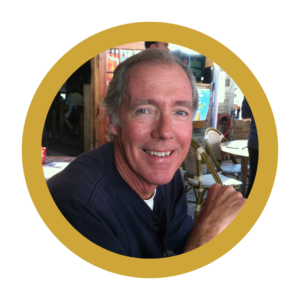 Bill Shields, the WBZ-TV, Boston reporter, passed away in February of this year. The following is excerpted from a February 8th story about him by Boston Globe obituaries editor Bryan Marquard: As an Emmy Award-winning reporter for WBZ-TV, Bill Shields reported from high atop Mount Washington in winter and from the ocean depths off Florida with treasure hunters — and stood in front of cameras during more storms than he’d care to count. For many viewers, though, the most memorable moments of his 41 years on WBZ aired during the past decade, after his first diagnosis with lung cancer, when he encouraged others to seek treatment and survive with the optimism and humor for which he was known. “I don’t call myself a journalist,” he said in an interview last fall with Upstage Lung Cancer, which raises awareness and funding for lung cancer research, after he had been treated for a second cancer diagnosis. “I call myself a storyteller.” Mr. Shields “had an amazing ability to tell personal stories with humanity, dignity, and grace,” Justin Draper, president and general manager of WBZ-TV, said in a statement. “Bill was an incredible journalist and storyteller who also made us laugh along the way. Bill was a legend at WBZ.” … Throughout Mr. Shields’s illness, his wife said, “he wasn’t a complainer. He made it easier for others. He always continued to try to be positive and look on the bright side.” That was true, too, when he was on camera. Mr. Shields brought empathy and compassion to difficult stories, including the delicate task of knocking on the doors of families whose loved ones had died — “the worst thing you have to do as a reporter.” … As a youth he hoped to eventually work in media. “It was something I told my parents about in high school. I wanted to be in the middle of the news,” he said in 2021, during WBZ’s piece about his retirement. “And so it was a dream come true when I got this job,” he added.
Bill Shields, the WBZ-TV, Boston reporter, passed away in February of this year. The following is excerpted from a February 8th story about him by Boston Globe obituaries editor Bryan Marquard: As an Emmy Award-winning reporter for WBZ-TV, Bill Shields reported from high atop Mount Washington in winter and from the ocean depths off Florida with treasure hunters — and stood in front of cameras during more storms than he’d care to count. For many viewers, though, the most memorable moments of his 41 years on WBZ aired during the past decade, after his first diagnosis with lung cancer, when he encouraged others to seek treatment and survive with the optimism and humor for which he was known. “I don’t call myself a journalist,” he said in an interview last fall with Upstage Lung Cancer, which raises awareness and funding for lung cancer research, after he had been treated for a second cancer diagnosis. “I call myself a storyteller.” Mr. Shields “had an amazing ability to tell personal stories with humanity, dignity, and grace,” Justin Draper, president and general manager of WBZ-TV, said in a statement. “Bill was an incredible journalist and storyteller who also made us laugh along the way. Bill was a legend at WBZ.” … Throughout Mr. Shields’s illness, his wife said, “he wasn’t a complainer. He made it easier for others. He always continued to try to be positive and look on the bright side.” That was true, too, when he was on camera. Mr. Shields brought empathy and compassion to difficult stories, including the delicate task of knocking on the doors of families whose loved ones had died — “the worst thing you have to do as a reporter.” … As a youth he hoped to eventually work in media. “It was something I told my parents about in high school. I wanted to be in the middle of the news,” he said in 2021, during WBZ’s piece about his retirement. “And so it was a dream come true when I got this job,” he added.
Carl Stevens retired from full-time reporting work at WBZ Radio in September, 2019. Here are excerpts from a Boston Globe Sept. 26,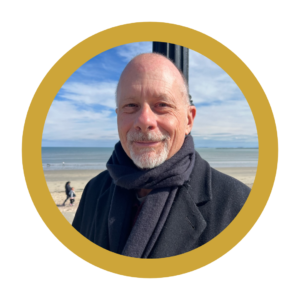 2019 story about Carl written by Globe staffer Travis Andersen: Carl Stevens, the legendary WBZ radio reporter and poet known for his signature voice and calm demeanor during chaotic press scrums, is dialing it back. Stevens, 64, said in a Facebook post Friday that he’s now working part-time at the station he’s called home since 1991. “I start working part time on Monday. Here’s a note that I sent to my colleagues at the station a couple weeks ago,” Stevens wrote. The note began, appropriately enough, with a rhyming couplet: “At the age of sixty-four/I don’t want to do this anymore.” Stevens continued, “Management has kindly granted my request to work part-time. For that, I am grateful. I will feed in one story per day. Maybe more. I don’t really know. Maybe an occasional poem. It’s kind of an experiment of necessity. I got old.” He wrote that he no longer wants to “drive through nor’easters, trudge through blizzards, walk up an icy hill to a three-alarm fire, or transcribe the tears of a grieving father. I’ve had enough icy hills. I’ve had enough tears. I got old.” … He also reflected movingly on the recent deaths of several colleagues, including WBZ radio reporter Lana Jones, who died [in 2018] at the age of 62 and later received a posthumous induction into the Massachusetts Broadcasters Hall of Fame. Stevens had marked Jones’s passing with one of his beloved poems that he records and posts to social media, garnering a sizable cult following among the local media literati. “I think, with me, there’s been an erosive effect of all the deaths: Lana, Gary, Gil, Mark, Joe, Dave, Sully, Bruds, Darryl, others,” Stevens wrote. “Lana was two months older than me. Gary [LaPierre] and Gil [Santos] were my mentors. It was the three of us in the newsroom when I first started at WBZ. Several months ago, as I was preparing the eulogy for Gary, I was thinking that I needed to stop working. That’s what Gary did when he turned 64. Went radio ‘cold turkey.’ … So, Stevens plans to stick around in a limited capacity. … “I might report for another three months, or maybe twenty years. I really don’t know. As a general assignment reporter, you learn to embrace the reality of uncertainty. … To be a good writer or anchor or editor or reporter or web person, you need passion and intelligence. We have plenty of that in the newsroom now. It bodes well for the future of WBZ.”
2019 story about Carl written by Globe staffer Travis Andersen: Carl Stevens, the legendary WBZ radio reporter and poet known for his signature voice and calm demeanor during chaotic press scrums, is dialing it back. Stevens, 64, said in a Facebook post Friday that he’s now working part-time at the station he’s called home since 1991. “I start working part time on Monday. Here’s a note that I sent to my colleagues at the station a couple weeks ago,” Stevens wrote. The note began, appropriately enough, with a rhyming couplet: “At the age of sixty-four/I don’t want to do this anymore.” Stevens continued, “Management has kindly granted my request to work part-time. For that, I am grateful. I will feed in one story per day. Maybe more. I don’t really know. Maybe an occasional poem. It’s kind of an experiment of necessity. I got old.” He wrote that he no longer wants to “drive through nor’easters, trudge through blizzards, walk up an icy hill to a three-alarm fire, or transcribe the tears of a grieving father. I’ve had enough icy hills. I’ve had enough tears. I got old.” … He also reflected movingly on the recent deaths of several colleagues, including WBZ radio reporter Lana Jones, who died [in 2018] at the age of 62 and later received a posthumous induction into the Massachusetts Broadcasters Hall of Fame. Stevens had marked Jones’s passing with one of his beloved poems that he records and posts to social media, garnering a sizable cult following among the local media literati. “I think, with me, there’s been an erosive effect of all the deaths: Lana, Gary, Gil, Mark, Joe, Dave, Sully, Bruds, Darryl, others,” Stevens wrote. “Lana was two months older than me. Gary [LaPierre] and Gil [Santos] were my mentors. It was the three of us in the newsroom when I first started at WBZ. Several months ago, as I was preparing the eulogy for Gary, I was thinking that I needed to stop working. That’s what Gary did when he turned 64. Went radio ‘cold turkey.’ … So, Stevens plans to stick around in a limited capacity. … “I might report for another three months, or maybe twenty years. I really don’t know. As a general assignment reporter, you learn to embrace the reality of uncertainty. … To be a good writer or anchor or editor or reporter or web person, you need passion and intelligence. We have plenty of that in the newsroom now. It bodes well for the future of WBZ.”
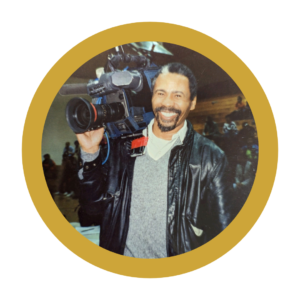 Therman Toon was the first Black news photographer in the New England area. He risked his life on several occasions filming the busing of school students in Boston. The following is excerpted from the September 22, 2005 Bay State Banner newspaper: Therman “Noot” Toon passed away at his Dorchester home Monday at the age of 62. Present were his wife Cathy, his daughter Nicole, and his son, Marlon in addition to many other family members and friends. Therman, the youngest son in a family of 11, will be remembered as a pioneering black TV news photographer. He was the first Black TV news photographer in New England. He began his career in 1968 with Channel 7 (then WNAC-TV), covering race riots in Boston that followed the assassination of Dr. Martin Luther King, Jr. Therman’s courage and determination ensured safe access for all media in the most strife-torn sections of Boston. Therman’s 37-year career at Channel 7 included coverage of most of the major stories and events that shaped and changed the New England region. His award-winning assignments included coverage of court-ordered school desegregation in Boston; the Delta plane crash at Logan Airport (1972); the Claus Von Bulow trials; Walpole Prison riots (included interviews with Albert DiSalvo “The [alleged] Boston Strangler”); the Red Sox pennant victory ecstasy and World Series despair (1975); the great Chelsea fire (1976); Boston’s bi-centennial celebration and the parade of the tall ships (1976); the blizzard of ’78; the 1980 presidential campaign; NAACP national conventions (New Orleans, Baltimore, Boston); “Louis Farrakhan; Eye of the Storm” (1985); the visit of Queen Elizabeth to Boston (1989); Charles Stuart and the murder case surrounding him (1989); South African Anglican Archbishop Tutu’s visit to Boston (1990); the great art heist (1990); the Charlestown dock fire (1995); the nanny trial (1998); JFK Jr memorial coverage (1999); 9/11 and its aftermath. Therman Toon’s professional and community achievements have been recognized with numerous Boston Press Photographer awards, The Black Achiever Award, and the NATAS “Silver Circle Award” for lifetime achievement. … Therman Toon’s work with young, aspiring journalists is also part of his legacy. He used a building he owned in Dudley Station to establish a practice studio where young people could become familiar with photographic equipment in a news studio. He spent countless hours counseling and critiquing their work.
Therman Toon was the first Black news photographer in the New England area. He risked his life on several occasions filming the busing of school students in Boston. The following is excerpted from the September 22, 2005 Bay State Banner newspaper: Therman “Noot” Toon passed away at his Dorchester home Monday at the age of 62. Present were his wife Cathy, his daughter Nicole, and his son, Marlon in addition to many other family members and friends. Therman, the youngest son in a family of 11, will be remembered as a pioneering black TV news photographer. He was the first Black TV news photographer in New England. He began his career in 1968 with Channel 7 (then WNAC-TV), covering race riots in Boston that followed the assassination of Dr. Martin Luther King, Jr. Therman’s courage and determination ensured safe access for all media in the most strife-torn sections of Boston. Therman’s 37-year career at Channel 7 included coverage of most of the major stories and events that shaped and changed the New England region. His award-winning assignments included coverage of court-ordered school desegregation in Boston; the Delta plane crash at Logan Airport (1972); the Claus Von Bulow trials; Walpole Prison riots (included interviews with Albert DiSalvo “The [alleged] Boston Strangler”); the Red Sox pennant victory ecstasy and World Series despair (1975); the great Chelsea fire (1976); Boston’s bi-centennial celebration and the parade of the tall ships (1976); the blizzard of ’78; the 1980 presidential campaign; NAACP national conventions (New Orleans, Baltimore, Boston); “Louis Farrakhan; Eye of the Storm” (1985); the visit of Queen Elizabeth to Boston (1989); Charles Stuart and the murder case surrounding him (1989); South African Anglican Archbishop Tutu’s visit to Boston (1990); the great art heist (1990); the Charlestown dock fire (1995); the nanny trial (1998); JFK Jr memorial coverage (1999); 9/11 and its aftermath. Therman Toon’s professional and community achievements have been recognized with numerous Boston Press Photographer awards, The Black Achiever Award, and the NATAS “Silver Circle Award” for lifetime achievement. … Therman Toon’s work with young, aspiring journalists is also part of his legacy. He used a building he owned in Dudley Station to establish a practice studio where young people could become familiar with photographic equipment in a news studio. He spent countless hours counseling and critiquing their work.

